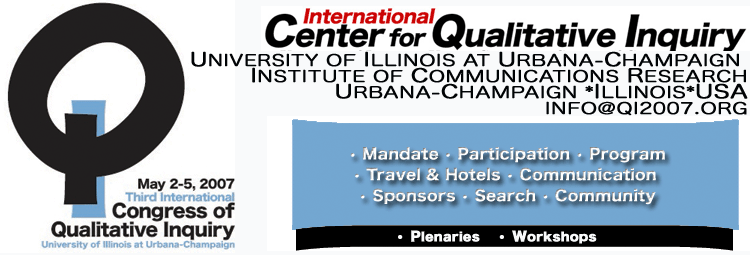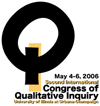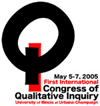
|
WHAT'S
NEW |
The Third International Congress of Qualitative Inquiry will take place at the University of Illinois, Urbana-Champaign, from May 2-5, 2007. The theme of the Congress, building on Jan Morse, is "Qualitative Inquiry and the Politics of Evidence." Participants will explore the politics of evidence and truth and what these terms mean for qualitative inquiry in this new century. If we as qualitative researchers do not define these terms for ourselves, someone else will. Questions to be considered include: In qualitative inquiry, What is truth? What is evidence? How is evidence evaluated? Can evidence be manipulated? " How can qualitative research inform the policy-making process? How is qualitative evidence represented, discounted, or judged to be unacceptable? What is a fact? What is true, or false, or evidence is determined by socially defined criteria. Different discourses--law, medicine, history, cultural, or performance studies--- define qualitative evidence differently. The Congress will consider the influence of scientifically based research (SBR) models on qualitative inquiry. These models are becoming quite influential in other nations (U. K. South Africa, Australia). The Congress will also consider what evidence and truth mean under the terms of postpositivism, poststructualism, indigenous, democratic, postcolonial, queer, feminist, performative, and participatory models of inquiry. Participants will explore new ways of evaluating and using qualitative evidence in social policy arenas. They will examine how new understandings of qualitative evidence can advance the goals of social justice and progressive politics. The 2007 Congress has several new and returning co-sponsors, including Women and Gender in Global Perspectives (UIUC), the Program in Global Studies (UIUC), Sage Publications, LeftCoast Press, The Society for the Study of Symbolic Interaction, and the Manchester Discourse Power Group (DPR). Session Themes will include, but not be confined to, rethinking such terms and topics as: mix-methods, voice, authenticity, lived experience, the politics of evidence, evidence-based research, research design, data, empirical material, epistemology, triangulation, validity, reliability, coding, sampling, induction, deduction, naturalism, generalizability, science, analysis, interpretation, rules of inference, models of quality, case-based, collaborative, mixed and multi-method approaches, narrative and performative criteria of evaluation, criteriology, pragmatism, interpretive rigor, constructivist criteria, action-based criteria, transformative-emancipatory criteria, warrantability, writing as interpretation, trustworthiness, collaborative action research, auto- and performance ethnography, arts-based inquiry, coloring epistemology, colonial and post-colonial epistemologies, critical performance narratives, critical pedagogy, democratic methodologies, discourse, ethnodrama, epistemology, social justice criteria, the ethics of evidence, ethics and IRBs, womanist inquiry, critical focus groups, funding qualitative health care research, new rules of evidence for grounded theory, advocacy as method, qualitative evaluation inquiry, new technologies of evidence and inference. Half-day (morning and afternoon) pre-conference, professional workshops will be held on May 3. The Congress will also consist of keynote, plenary, spotlight, featured, regular and poster sessions. There will be an opening reception and barbeque, and a closing old-fashioned midwest cook-out. To learn more about the Third International Congress, please email info@qi2007.org. Pre-Conference Language Events On May 2 there will be three pre-conference language events, one for Spanish-speaking scholars, a second for Japanese-speaking scholars, and a third Turkish scholars. Delegates need to check our website for developments with these special events. More detail... Couch-Stone Meeting The 2007 Couch-Stone Symposium of the Society for the Study of Symbolic Interaction will be held in conjunction with the “3rd International Congress. The SSSI will be co-sponsors of the Congress, and will share their program and keynote speaker with Congress participants. This joint conference will be a golden opportunity for IAQI members to learn more about symbolic interactionism. It also presents an opportunity for symbolic interactionists to learn more about the IAQI community. To help make this joint meeting a success, delegates are invited to consult the call for papers in the present issue of SSSI Notes (http://sun.soci.niu.edu/~sssi/newsletter/newslet.html). More detail... DPR Session Our Manchester colleagues believe it is useful to conceptualize research as subversive activity, as work that unsettles, challenges and contests existing social and educational formations. Subversive research resists work that is at ease with the methodological preconceptions of federal and private funding bodies. subversive scholars seek discourses of resistance that contest current notions of truth, justice, healing, health, schooling, identity, learning and teaching. IAQI has a reciprocal relationship with the DPR group. They will have several high profile sessions on the themes of the Congress. In turn, IAQI will have a publicity stand and a videoconference presence at the March 25-27, 2007 DPR Conference at Manchester Metropolitan University.More detail... Illinois Qualitative Dissertation Award The International Center for Qualitative Inquiry is pleased to announce the annual Illinois Qualitative Dissertation Award, for excellence in qualitative research in a doctoral dissertation. Eligible dissertations will use and advance qualitative methods to investigate any topic. Applications for the award will be judged by the following criteria: clarity of writing; willingness to experiment with new and traditional writing forms; advocacy, promotion, development, and use of qualitative research methodologies and practices in new fields of study, and in policy arenas involving issues of social justice. There are two award categories, traditional (Category A), and experimental (Category B). Submissions in both categories address social justice issues. Submissions in Category A use traditional qualitative research and writing forms, while Category B submissions experiment with traditional writing and representational forms. An award of $250 will be given to each winner. All doctoral candidates are eligible, provided they have successfully defended their proposals prior to January 1, 2007, and will defend their final dissertation by April 1, 2007. Receiving or being considered for other awards does not preclude a student from applying for this award . Applications are due Febuary 1, 2007. The 2007 award, co-sponsored with Sage Publications, will be made at the opening plenary session of the Congress. For more information, please visit the website: http://www.c4qi.org/award.html Keynote speakers Professor D. Soyini Madison, " Dangerous Ethnography and 'Utopian Performative' " Professor D. Soyini Madison will be discussing the implications of performance as theory, method, event, experience, and object in the labor and love of critical ethnography. Performance intensifies the “critical” in critical ethnography by placing the expressive body and the contexts of its yearnings at the core of fieldwork praxis. Through examples from her fieldwork in Ghana, Madison examines how critical performance ethnography engages subaltern subjectivity and creation that opens possibilities for utopian visions and alternative futures. What does it mean when ethnographers and qualitative researchers embrace domains of performance to live in, write about, report on, and interpret “the field”? What substantive contributions and risks does performance make to qualitative inquiry? These questions will be addressed in the presentation through illustrations from Madison’s fieldwork on indigenous human rights activism in Ghana and through scholarly meditations on the politics of performance. Professor Julianne Cheek, "A Fine Line: Positioning Qualitative Inquiry in the Wake of the Politics of Evidence" Julianne Cheek is a Professor in the Institute of Nursing and Health Sciences at the University of Oslo and the School of Health Sciences at the University of South Australia. She is Director of a performance based research centre - the Centre for Research into Sustainable Health Care and has also held the university portfolio of Director of Early Career Researcher development with responsibility for post doctoral development at the University of South Australia. She has attracted funding for many qualitative research projects including funding from the Australian Research Council and the National Health and Medical Research Council. She has three major interests: the development of methodological understandings pertaining to qualitative research with an emphasis on funded research; research in the substantive area of care of the older person; and the application of Foucauldian and postmodern perspectives to health care. She holds honorary professorships in South Africa and the UK. She is widely published including her book Postmodern and Poststructural Approaches to Nursing Research (Sage US 2000). She is co-editor of the journal Health: An Interdisciplinary Journal for the Social Study of Health, Illness and Medicine, associate editor of Qualitative Health Research, and on the editorial boards of 6 other journals. She is currently working on two new books: one to do with notions of the research product in the 21st century and the other on the role of theory in qualitative research. More detail... Pre-conference Workshops AM Workshops (8:30-11:30am)1. "Doing Situational Maps", Adele E. Clarke 2. "Writing Lives and Writing Deaths", Laurel Richardson 3. "New Experimental Writing Forms", Yvonna Lincoln 4. "New Indirections for Qualitative Research", Ian Stronach, Jo Frankham, Dean Garratt, and Heather Piper 5. "The Critical Use of Focus Groups", Gregory Dimitriadis and George Kamberelis 6. "Doing Collective Biography", Bronwyn Davies 7. "State of the Art: The Latest in Qualitative Software Advances", Ray Maietta and Cesar Cisneros 8. "In the PARticulars: Critical dilemmas and radical possibilities of participatory action research", Caitlin Cahill, Brett Stoudt, Maria Elena Torre and Eve Tuck 9. ""Picture your data: Learn about new perspectivs for your QDA",Anne Kuckartz 10. "Evaluación De Comunicaciones Cualitativas (Evaluation Of Qualitative Communications)", (IN SPANISH ONLY), Maria del Consuelo Chapela Mendoza & Martinez Salgado Ofelia Carolina PM Workshops (12:30-3:30pm)11. "An Introduction to Constructing Grounded Theory", Kathy Charmaz 12."Writing Autoethnography and Narrative in Qualitative Research", Carolyn Ellis and Arthur Bochner 13. "Writing the Body", Pirkko Helena Markula, Jim Denison, Toni Bruce, and Robert Rinehart 14. "Interpreting, Writing Up and Evaluating Qualitative Materials", Robin Jarrett and Angela Odoms-Young 15. "Mixed-Method Social Inquiry: Possibilities and Strategies", Jennifer C. Greene 16. "Performance Ethnography", Norman Denzin 17. "Evidence Based Social Work: Where are we Going? How do we Get There?", Karen Staller and Jane Gilgun 18. "Performative Writing", Ron Pelias 19. "Computer Assisted Software for Qualitative Data Analysis: How to Integrate Software into Your Analysis of Qualitative Data", Sharlene Hesse-Biber 20. "That Can't Be Wrong -- I Do that Myself: Rethinking Whiteness in Research and the Classroom ", Audrey Thompson
Partial List of Conference Session Topics
|
|||||||||||||||||||||||||||
|
OTHER QUALITATIVE CONFERENCES |
||||||||||||||||||||||||||||
|
2007 Ethnographic Poetry Competition 20th Conference on Interdisciplinary Qualitative Research Consumer Culture Thery Conference 2nd International Qualitative Research Conference (Mexico) QRAM-- Annual Berlin Meeting Qualitative Research (BMT)
|
||||||||||||||||||||||||||||
| PAST
CONFERNCES |
||||||||||||||||||||||||||||
|
QI2006
QI2005
|
Sponsor Links:
Women
and Gender in Global Perspectives Program
Illinois Program for
Research in the Humanities
Bureau of Educational
Research
The Unit
for Criticism and Interpretive Theory
Gender & Women's
Studies Program
Department of Advertising
College of Communications
Center for Qualitative Inquiry
The Education and Social Research Institute (ESRI),
Manchester Metropolitan University, UK
Sage Publications
The International Association
of Educators
International Journal of Progressive Education
Turkish Journal
of Educational Policy Analysis and Strategic Research
Center for Global Studies
SSSI
LeftCoast Press
Institute of Communications Research
Native American House/American Indian Studies(NAH/AIS)
The Illinois Program for Research in the Humanities(IPRH)

